- Home
- Jim Thompson
The Alcoholics
The Alcoholics Read online
The Alcoholics
Jim Thompson
Little, Brown and Company
New York Boston London
Begin Reading
Table of Contents
About the Author
Preview of Savage Night
Copyright
All rights reserved. In accordance with the U.S. Copyright Act of 1976, the scanning, uploading, and electronic sharing of any part of this book without the permission of the publisher constitute unlawful piracy and theft of the author’s intellectual property. If you would like to use material from the book (other than for review purposes), prior written permission must be obtained by contacting the publisher at [email protected]. Thank you for your support of the author’s rights.
1
His real name was Pasteur Semelweiss Murphy; so naturally he called himself Dr. Peter S. Murphy: rather, his patients and colleagues knew him by that name. In his own mind, he called himself names as hideous and hopeless as the agony of which they were born. You!—he would snarl savagely. You goofy-looking beanpole! You lanky, long-drawn son-of-a-bitch! You scrawny red-haired imbecile!
Doctor Murphy had always spoken to Doctor Murphy with disparagement and invective. But never with such frequence and intensity as since he had become the proprietor of El Healtho—Modern Treatment For Alcoholics. Not until then had he called himself dishonest; never before, in the endless annals of Murphy vs. Murphy, had the defendant been charged with gross incompetence. And yet—and this was odd—the knowledge that he was about to be divorced from El Healtho, no later, barring miracles, than the close of business today, did nothing to modify or mollify the prosecution. On the contrary, tonight he would shut down the sanitarium, and along with everything else, he would stand accused of failure, of bollixing a job, of screwing up the works. By God, but good!
El Healtho perches on a cliff overlooking the Pacific in the southerly limits of the city of Los Angeles. It is a rambling stucco and tile structure, styled in that school of architecture known as Spanish Mediterranean to its adherents and “California Gothic” to its detractors; originally the home of a silent motion-picture actor whose taste, whatever else may be said about it, proved considerably better than his voice.
As a matter of fact, it was not particularly unpleasing to the eye—unless that eye were Doctor Murphy’s.
His long scrawny shanks clad in a pair of faded-red swim trunks, the good doctor squatted on the beach and stared blindly at the Pacific; April sunlight in his eyes, Arctic ice in his heart. He had been swimming for three hours when a great breaker had caught him up in its arms and hurled him rolling and spinning and half-drowned onto the sand. It had cast him up and out—and it should have, by God; he was enough even to make the ocean puke!—simultaneously burying him beneath a hundred-odd pounds of slithery seaweed.
Lying there, breathless, in the dank tentacled mess, he had remembered those searing lines from—from Wells? Yes, the Outline of History: “To this stage has civilization progressed from the slime of the tidal beaches…” And there had been a masochistic satisfaction in remembering, in associating the words with his own sorry state.
A hundred million years of life…and in what had it resulted? Well, it was obvious, wasn’t it? A pile of crap. A will-less thing, floating on the tide, lacking the elementary grace to sink out of sight.
Doctor Murphy had entered the ocean with the intention of drowning himself. He felt that it would be a good idea, a clean-cut scientific approach to an otherwise insoluble problem; and a secret voice had advised him that here was triumph, not surrender, not exit but ingress. He was not sure of the soundness of his hunch, nor the veracity of the voice. Perhaps it would not have been a good idea; perhaps his voyage would have terminated in the phosphorescent muck of the ocean bottom. But—well, that was the point, you see. The fact that he wasn’t sure. How in hell could a man know whether his ideas were good if he never tried them out?
And if a man wasn’t willing to act on his ideas—if he didn’t have the guts to act on ’em—why in the hell did he have to keep having ’em?
“Just once”—he spoke to the Pacific, his blue eyes frosty. “If I could just once, for once in my goddam life…”
Life had teased and taunted Doctor Murphy severely. It had constantly confronted him with problems, then presented him with solutions—a single solution to each—which he was incapable of using.
It had begun this evil teasing years before, long before he became Dr. Peter S. Murphy and was merely a freckle-faced brat—ol’ Doc Murphy’s kid, Pasty. Even then, life was giving him problems and answers—that’s-the-only-way answers—leaving the rest of the world undisturbed. Was a dog beaten to death? Life brought the matter immediately to Doc Murphy’s kid, advising him exactly what should be done…if anything was to be done at all. The other townsfolk were undisturbed; the incident was regrettable, sad, but best forgotten. They were allowed to forget it. But not Pasty Murphy. He had to do something—and the one adequate thing, the only thing, he could not do. He could procure the horse-whip, yes; he could find exactly the right place to lie in wait. And he could stand up silently in the darkness, bringing the whip back over his shoulder. But that was all he could do, that was as far as he could go. He could not knock the dog-beater senseless, then beat the dog-beater’s rotten ass to the color of eggplant.…
Once, while he was interning at Bellevue, Dr. Pasteur Sem—that is, Dr. Peter S. Murphy, had lined up the most delectable piece in all Manhattan. She was a nurse, and she wasn’t selling the stuff, you understand. But she required a great deal of working on. Well, young Doc Murphy had worked on that babe for months; and finally his victory seemed as imminent as it was inevitable. One firm and final move, and the jackpot would be his. So, with twenty dollars saved and another twenty borrowed, he took her to a nightclub. And their waiter—oh, damn his white-tied soul—had shamed and snubbed them unmercifully. He had made Doc look like a cheapskate, a boob, a shrimp, a guy contemptible and unworthy of the prize he sought.
Doc had laid his steak knife on the table, with the tip pointing outward. Casually, he had placed his elbow against the handle. Then, he waited, firmly intending to deprive that waiter permanently of what he himself had, but couldn’t use. His opportunity came—and went. In the end, he and the girl slunk out of the nightclub, leaving the waiter triumphant and unharmed.
A couple of hundred yards away, now, around a curve in the beach, a neat blue trailer was parked. Doc turned and looked at it, just as a man leaned out the door and waved to him. Beckoned to him. Doc groaned and cursed.
He did not want to talk to Judson, ex-Navy corpsman, now the night attendant, night nurse, night everything at El Healtho. He didn’t want any lectures from Judson, no matter how politely and subtly those lectures were delivered. He considered thumbing his nose at the night man. Why not? Who was the doctor in this place, he or Judson? Then, he stood up and shambled toward the trailer.
Though his night shift was over, and he would necessarily be going to bed in a few minutes, Judson had replaced his white uniform with spotless tan slacks and a short-sleeved sport shirt. Looking at him in his neatness, his cleanliness—looking at the man’s chiseled black face with its serene intelligent eyes—Doc felt awkward and dirty and shabby. And somehow shamed. Judson was a Negro. He deserved better than his job. Judson served coffee on a small table set up on the sand. He offered cigarettes, made polite comment on the pleasantness of the morning. Doc waited warily.
“I don’t like to mention it, Doctor, but—”
“The hell you don’t!” snarled Doctor Murphy. “Well, go on. Get it off your chest!”
Judson looked at him gravely, silently.
The doctor grunted a word of apology. “I know. I talked pretty rough t
o Rufus, and it was the wrong thing to do. But dammit, Jud, look at the stunts he pulls! If I take my eyes off of him for a minute, he’s—well, you know how he is!”
“I know,” nodded Judson, “but it’s only because he wants to better himself. He’s ambitious.”
“So he’s ambitious,” snapped Doc. “He wants to learn. Fine. Why can’t he go about it the right way? Why can’t he be, uh, well more like you?”
“Probably because he isn’t me,” Judson suggested pleasantly. “Or are you of the opinion all Negroes are born with equal abilities and receive equal opportunities?”
“Oh, go to hell,” said Doc, wearily.
“As a matter of fact,” said Judson, “I hadn’t intended to say anything about Rufus. I didn’t see any need to. I knew you were at least as much disturbed by what you said to him as he was—”
“The hell I was!” lied Doc. “I told him exactly what I should have!”
“…what I really wanted to talk about was Mr. Van Twyne. Do you think he should be here, Doctor? A prefrontal lobotomy case?”
“This is an alcoholic sanitarium,” said Doctor Murphy. “He’s an alcoholic.”
“I see.”
“Well, he is. He’s worse than an alcoholic—he’s a psychopathic drunk. Any other guy, a guy without dough, would be in the bughouse or Alcatraz for the stunts he’s pulled. He’s damned lucky that the courts gave him this chance; let him have the pre-frontal instead of—”
“The operation was performed in New York, Doctor.”
“That’s bad? Where the hell would you go for a prefrontal?”
“To New York,” said Judson. “And I would remain there, afterwards, under the care of the surgeons who performed it. Certainly, I would not allow myself to be transported across the country, a few days later, to an obscure—er—”
Doc’s pale, never-tanning face had reddened. “I’m a horse-doctor?” he demanded. “I’m a diploma-mill quack? Why, dammit, if I’d wanted to turn this place into a cure-joint—if I’d been willing to sell silver salts and nux vomica at fifty dollars a shot—I’d be rolling in dough instead of—of—”
“No one,” Judson was saying, “has more appreciation for your integrity and what you’ve tried to do here than I, Doctor. That’s why I couldn’t understand…will he be with us long?”
“I don’t know,” Doctor Murphy said, curtly. “What kind of night did he have?”
“Very bad, up until around midnight. Restive. Completely unresponsive to sedation. It was actually painful to watch him. He tried to talk to me, but having had none of the re-training he should have had—”
“Save it! Why didn’t you call me?”
“I was on the point of doing so when I discovered the trouble. I took off his sheets, and…”
Judson explained. Angry fires danced in the doctor’s eyes.
“That clumsy bitch!” he swore.
“Yes,” said Judson. “It’s hard to understand how a registered nurse could be so clumsy. How anyone who’s had the slightest patient training could be.”
“Well…” The doctor studied him frowning. “You’re all wet if you think she’s a fake. I checked her references myself.”
“I don’t doubt that she’s R.N., Doctor. I might say, however, that good references are rather easily come by.”
“But, I don’t—Are you trying to tell me that—”
“Only one thing. People work in places like these for only two reasons: Out of altruism, because, like you, they are genuinely interested in helping the alcoholic—”
“Me? Now, get this,” said Doctor Murphy. “If every goddam alcoholic in the world dropped dead tomorrow, it would tickle me pink. I mean it, by God! I hate every damned one of ’em!”
Judson laughed softly. Doctor Murphy glowered at him.
“That’s one reason,” the Negro continued. “And not, I’m afraid, a very common one. The other? Well, that might be broken down into two reasons. Because they cannot hold jobs elsewhere. Or because the alcoholic sanitarium, with a clientele which shuns publicity, gives them a better than even chance to satisfy abnormal appetites.”
“But you surely don’t think—”
“Only this, Doctor. Mainly this. That the world being as it is, it is a rather terrible thing to condemn a man like Van Twyne to live in it a helpless idiot.”
“Who’s condemning him? How do you know he wouldn’t be an idiot anyway? The pre-frontal is a hell of a long way from being perfected. It’s a last-ditch operation—something you have when there’s nothing left to lose. Where do you get that stuff, I’m condemning him?”
Judson shrugged. He picked up the doctor’s cup with a polite, “May I?”
Doc swung his hand, palm open, slapping the cup far out into the water.
“How about it?” he raged, kicking back his campstool. “Do you think I like this, any damned stinking part of it? Haven’t I sunk a fortune in this place without having a dime left to show for it? Haven’t I worked my ass off, with nothing but a high-paid bunch of whiners and incompetents to help me?”
Judson shook his head sympathetically. He was very fond of Doctor Murphy.
“Now, get this,” said the doctor, his voice hoarse. “I didn’t have Humphrey Van Twyne III flown across country. His family did. I didn’t solicit him as a patient. His family had him brought here. I didn’t want to treat him here. They—their own family doctor insisted on it. What the hell? Who am I to tell them what to do? What if I did tell them? They’d just dump him in another place.”
“I don’t think so,” said Judson. “I don’t think they could.”
“You don’t think period,” said Doctor Murphy. “You don’t know what I’m up against. If I don’t get—” He broke off the sentence abruptly. Something would turn up. Something had to turn up. He couldn’t admit to the cold facts: That he would have to raise fifteen thousand dollars today or go out of business, and that the Van Twynes were the only possible means of raising it.
“I’m the guy who has to do the thinking,” he continued. “I have to do the doing. Suppose I’m wrong. Suppose I weigh all the factors in the case and make my decision, and it turns out to be wrong. So what? I’m not infallible. I’m a doctor, not God. Goddammit, I’m not God!”
Judson turned his head and looked up the cliff. He looked back at the doctor, and nodded gravely.
“You are,” he said, “so far as he’s concerned.”
2
While Judson and the doctor debated—the one calm and implacable, the other stubborn and angry—still another person wrestled with the problem represented by Humphrey Van Twyne III. This was Rufus; Rufus, also Negro, the day attendant at El Healtho. Rufus was considerably afraid of Humphrey Van Twyne III—“the man with no brains,” as he thought of him.
Being an occupant of Room Four (or simply, Four, as the old-timers called it), the politely anonymous term for the sanitarium’s padded cell, the man required a great deal of waiting on. And much of that waiting on was required of Rufus. And while the man appeared docile enough, Rufus was quite sure that he wasn’t. He knew something of the man’s history. Even without brains, a person who pursued such whims as biting folks’ noses off was, in Rufus’ opinion, a decided menace.
He did not show this fear, of course; at least, he hoped he didn’t. For a medical man to show fear of a patient would be unseemly, and Rufus definitely was—in his own mind—a fully qualified practitioner. He held doctors’ degrees from the West Coast College of Astro-Cosmicology and the Arkansas Institute of Metaphysical Science. He had also done post-graduate work in Swedish massage. In view of these honors and the fact that he did “practice medicine”—at every opportunity and despite the most dogged and profane protests—his lack of medical education seemed of no moment whatsoever.
Seated in the kitchen of El Healtho, with two plates of ham and eggs in him and his fourth cup of breakfast coffee before him, Rufus thought about the man in Room Four, unconsciously flexing the muscles in his large chocolate-colored ha
nds. He could, he decided, “take care” of the man if he had to. But he sure hoped he wouldn’t have to. Physical contests with the patients were frowned upon, and Rufus, a devotee of the sciences, opposed them on principle. It was just plumb too bad, he thought ruefully, that Doctor Murphy would not let him “treat” the case.
He had almost got to the day before. All his equipment had been readied; and he had had the man’s winding sheets unwrapped to the waist. And then Doctor Murphy had stalked in and asked what in the hell he had thought he was doing.
Rufus had explained—given his diagnosis. He was convinced, he said, that segments of the man’s perverted brain remained in his system and were making him restless. Obviously, a series of colonic irrigations was indicated.
Doctor Murphy had kicked over the pan of warm soapy water. He had told Rufus to stick his goddam shitgun (now wasn’t that a pretty name to call a scientific instrument!) up his own butt. And he had declared that if Rufus didn’t stop his silly goddam horsing around (a pretty way for a doctor to talk!) he, personally, would kick his, Rufus’, goddam ass all the way into Beverly Hills.
Pretty—thought Rufus, gloomily, savoring his coffee. A pretty way for one professional man to address another. Oh, very pretty…Then he became aware that Josephine, the cook, was watching him, and he exchanged his downcast manner for one of frowning studiousness. He appealed to Josephine’s ever-near hysteria.
Drawing a toy stethoscope from the pocket of his white jacket, he blew through first one end, then the other, then draped them around his neck. Propping his chin up with one hand he slid the other inside his jacket, thus assuming a pose at once Napoleonic and convenient for scratching. Josephine started to giggle.
3
Back in the era surrounding World War I, the General had been prominently mentioned as a vice-presidential candidate.

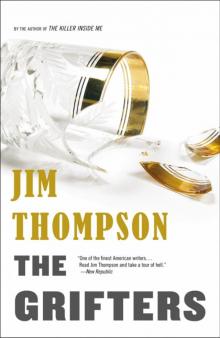 The Grifters
The Grifters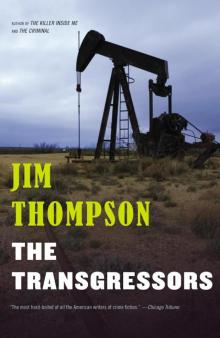 The Transgressors
The Transgressors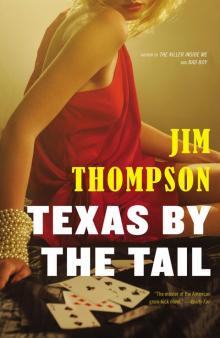 Texas by the Tail
Texas by the Tail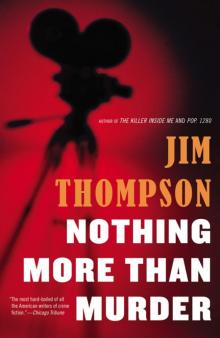 Nothing More Than Murder
Nothing More Than Murder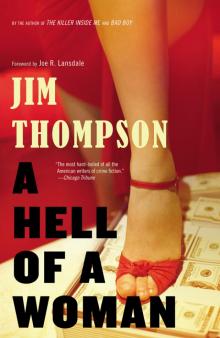 A Hell of a Woman
A Hell of a Woman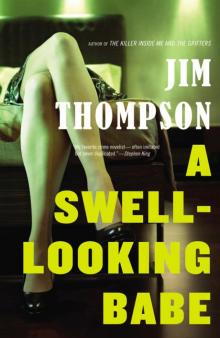 A Swell-Looking Babe
A Swell-Looking Babe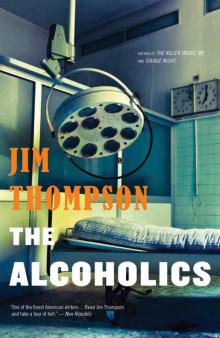 The Alcoholics
The Alcoholics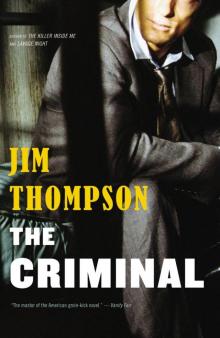 The Criminal
The Criminal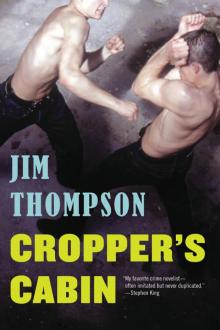 Cropper's Cabin
Cropper's Cabin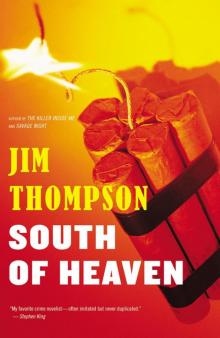 South of Heaven
South of Heaven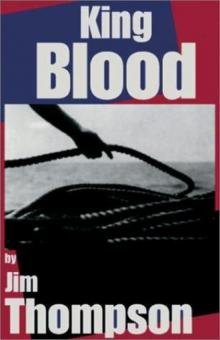 King Blood
King Blood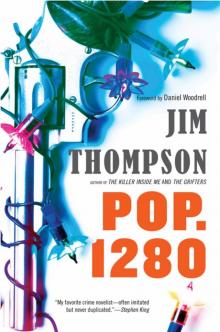 Pop. 1280
Pop. 1280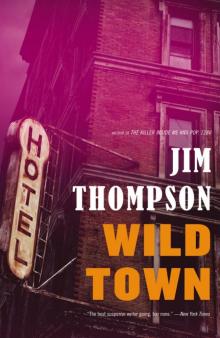 Wild Town
Wild Town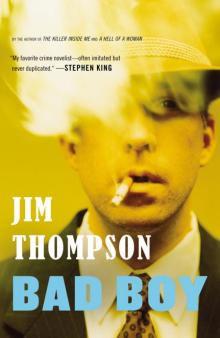 Bad Boy
Bad Boy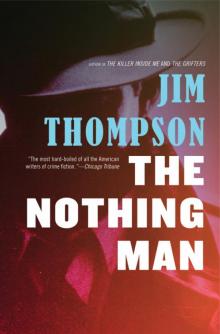 The Nothing Man
The Nothing Man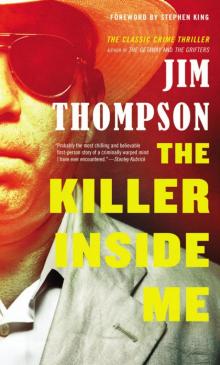 The Killer Inside Me
The Killer Inside Me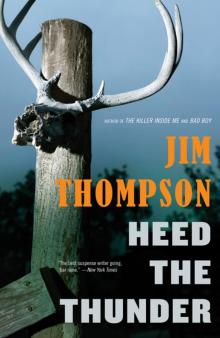 Heed the Thunder
Heed the Thunder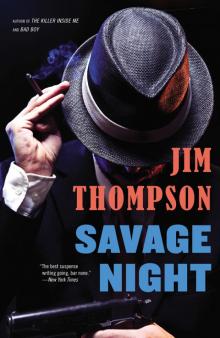 Savage Night
Savage Night Recoil
Recoil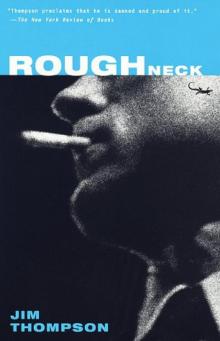 Roughneck
Roughneck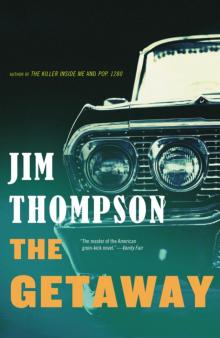 The Getaway
The Getaway